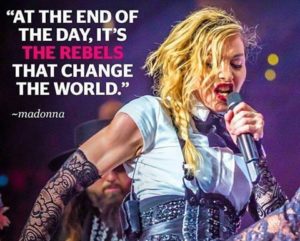
This week, I’m in Nashville where I’m speaking to youth workers about teaching God’s grand and glorious design for sex and gender. Since this issue is on our minds, I’m posting a three-part series on the Sex-Positive Movement, a trending and powerful influence on all of our kids. Today, Part 1.
Over thirty years have passed since an interviewer asked Madonna if she saw herself as “a kind of a sexual missionary.” This was her response: “I suppose that’s one way to look at it. . . Sex is the metaphor that I use, but for me really, it’s about love. It’s about tolerance, acceptance, and saying, ‘Look, everybody has different needs and wants and preferences and desires and fantasies.’”

Our kids may have no conscious clue about their expressive individualism, but they are being encouraged to live it out in every area of their lives. We hear it in phrases like “You be you”, “Just follow your heart!”, “Be true to who you are”, and “Find yourself.” Perhaps the most obvious place where we encounter these beliefs and behaviors in today’s world is in the realm of sex, marriage, and gender.
The worldview Madonna embraced and propagated through her music and presence are no longer fringe notions held by a small-yet-vocal minority. Instead, this worldview which is built on the foundation blocks of relativism and self-rule is not only majority opinion, but the prevailing set of assumed cultural beliefs that are guiding the behaviors of young and old alike.
Still not convinced? Just look around at film, music, books, television, and the content that’s so prevalent online. One recent and sobering example was pop star Cardi B’s hit song, “WAP”, which was released just a couple of years ago on August 7, 2020. . . which only set the table for other artists to put out music that builds on Cardi B’s message and takes it even further.
It starts with the song’s title, which is an acronym for a vile term for female genitalia that I can’t even bring myself to spell out here. The song’s title relates clearly to the lyrical and visual themes of the song. The video celebrates and promotes a version of female sexuality that is raw, expressive, table-turning dominant, and as one affirming critic has said, “Class-A filth, a torrent of horny one-liners. . .”[ii] It was a sign of the times that music critics loved it, and the music-consuming population loved it as well. Music listeners didn’t flinch. Instead, they applauded. “WAP” topped the global Spotify chart, debuted at #1 on The Apple Music songs chart (highest debut ever by a female artist), and debuted at #1 on the Billboard Hot 100 chart. To date, the song’s video on YouTube has garnered half a billion views.
You might ask, why was there little or no mainstream pushback on a song that New York Times’ music critic Ben Sisario said is “perhaps the raunchiest No. 1 single in history.”[iii]? It’s because the mainstream is celebrating a message that’s already deeply entrenched in our culture’s collective sex-positive beliefs and behaviors. Cardi B was not offering up ideas about sex and sexuality that were something new. Rather, she was telling us who we already are. . . and that fact means we need to wake up and respond.
In Part 2. . . What does the Sex-Positive Movement believe?
To download a FREE pdf copy of this entire three-part series, click here.
In addition, check out this helpful article from our friend and author, Dr. Leonard Sax, on Cardi B, her song, and what it means for our kids.
[i] Charles Taylor, A Secular Age, p. 475.
[ii] https://www.vulture.com/2020/08/cardi-b-megan-thee-stallion-wap-song-review.html
[iii] https://flipboard.com/topic/taylorswift/cardi-b-and-megan-thee-stallion-s-raunchy-wap-rockets-to-no-1/a-QlTSREKMShycebMhMFvWPg%3Aa%3A3195393-0a4f1162b1%2Fnytimes.com